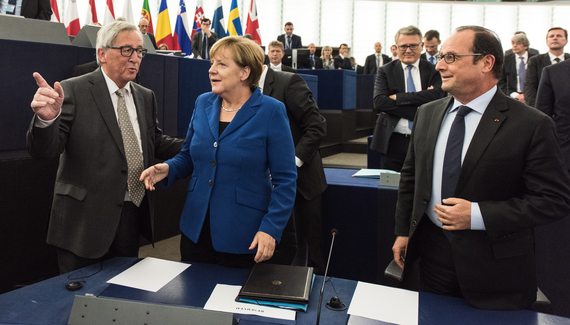With Britain set to leave the EU, the veto against deeper political, economic, and defense integration is seemingly out of the picture. "Ever closer union" is now a practicable prospect. Following the vote to Leave the EU, Chancellor Merkel and President Hollande released a white-paper outlining a vision for deeper economic and political integration once Britain formally triggers Article 50 and the exit process begins. This proposal, unofficial as of yet, will set the tone for the future of the EU. Will reform mean more or less Europe? Will the EU be given more powers to regulate and tax the economy, secure the external borders, and guide the foreign affairs of the continent, or will these powers return to the member states? These are not questions that are asked simply for the sake of having a debate. These questions demand answers. These answers will come from continental Europe (and Rep. of Ireland), where pro-EU sentiment is strong. With the UK removing itself from the scene, deeper integration is not just likely, it is inevitable.
Since Thatcher, British attitudes towards the EU have been largely skeptical, if not outright hostile. British politicians (on the left and right) have supplanted a deeply ingrained distrust of the Brussels machine, lambasting its bureaucracy, regulatory regime or even its legitimacy. The cries during the referendum campaign about British sovereignty being chiseled away by EU technocrats were not new- they've been the pillar of the euroskeptic mantra since the Thatcher years. That said, however, the reality is that the only country that has ever really held these attitudes at such a mainstream level is the United Kingdom. Since the introduction of the euro in 2000, Eurozone countries have committed to deeper political and economic union at each juncture because the success of the common currency, Schengen, and the Single Market depend on it.
The European Central Bank, the European Stability Mechanism, the European Investment Bank, and the euro itself, all rely on the 19 eurozone countries to adopt similar fiscal and monetary policies. And with Britain out of the way and the threat of a veto all but gone, expect to see more economic authority transferred from member states to the EU over the next few years.
Already, we have seen Germany Finance Minister Wolfgang Schäuble call for an EU-wide corporation tax to pay for infrastructure investment in the southern countries. Such a move would give Brussels greater economic authority, paving the way for a tax-and-spend prerogative to be shifted permanently to the EU from member states.
Pundits claiming to know the pulse of European political sentiment argue that the remaining 27 states want to see less EU intervention, not more. While it is true that public distrust of EU institutions is at an all-time high, it is by no means held by a majority of EU nationals. Given the enormity of the challenges facing Europe at this present time in history, the case for a emboldened and visionary EU is clear. There must be a common European policy on refugee placement. There must be a common European policy on external border security. There must be a common European policy on fiscal and monetary matters, particularly debt and deficit reductions and targets. And finally, there must be a common European policy on taxation and tax avoidance. No member state- especially no eurozone country- should give preferential treatment to corporations who are based or hire in that country like Luxembourg and Ireland have done in the past.
We all know the EU has its faults- it is slow to respond to crises, it is overly bureaucratic and it oversteps its treaty-based authority at times. The solution is not to run away from the European Project but to embrace it.
One of the most famous Britons of all time called for a united Europe at a speech at the University of Zurich in 1946: " "There is a remedy which ... would in a few years make all Europe ... free and ... happy. It is to re-create the European family, or as much of it as we can, and to provide it with a structure under which it can dwell in peace, in safety and in freedom. We must build a kind of United States of Europe." Churchill knew then what is self-evident now. In order to safeguard European peace and prosperity, we need more cooperation, not less. We need a Europe in which people and goods are free to travel without borders and we need a Europe that stands up for human rights and the dignity of the human person. The EU, in the eyes of most Europeans, remains a pillar of freedom and democracy. Let's build on it, not abandon ship.

